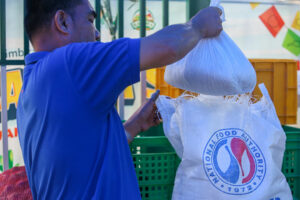SPEAKER Ferdinand Martin G. Romualdez directed a congressional think-tank to assess the feasibility of making the Marcos administration’s P20-per-kilo rice program available to half the population, with the study to evaluate the program’s fiscal requirements and the legislative means to move it forward.
The Congressional Policy and Budget Research Department was tasked with producing a report within 60 days, to guide legislators during budget hearings set later this year, Mr. Romualdez said.
“This study will not be limited to subsidy calculations. We need to overhaul the entire system — from seed to store shelf,” he said in a statement.
The government in early May started selling P20-per-kilo rice in some state-subsidized mini-markets, and plans to continue retailing the subsidized rice to low-income families and other disadvantaged categories until December.
President Ferdinand R. Marcos, Jr. campaigned in 2022 on a pledge to lower rice prices to P20 per kilo, but the early years of his administration have been marked by a surge in the cost of rice.
“If it can be done in some areas, it should be achievable nationwide,” Mr. Romualdez said. “It is now our job in Congress to support that vision with data, strategy and decisive legislation.”
The Speaker last month pledged to allocate funding for the rice subsidy program in the 2026 budget.
Mr. Romualdez said the program could cost the government about P51.1 billion annually, leading him to propose a four-year “phase-in plan” to ensure its sustainability.
“In 2025, the program will cover only the bottom 20% of the population, requiring about P17 billion. In 2026, it will expand to the bottom 35%, costing P30 billion,” he said.
“By 2027, it could reach the bottom 50%, with the full P51 billion requirement,” he added, saying that authorities should look at optimizing the system and integrating it with other food aid programs by 2028. — Kenneth Christiane L. Basilio

